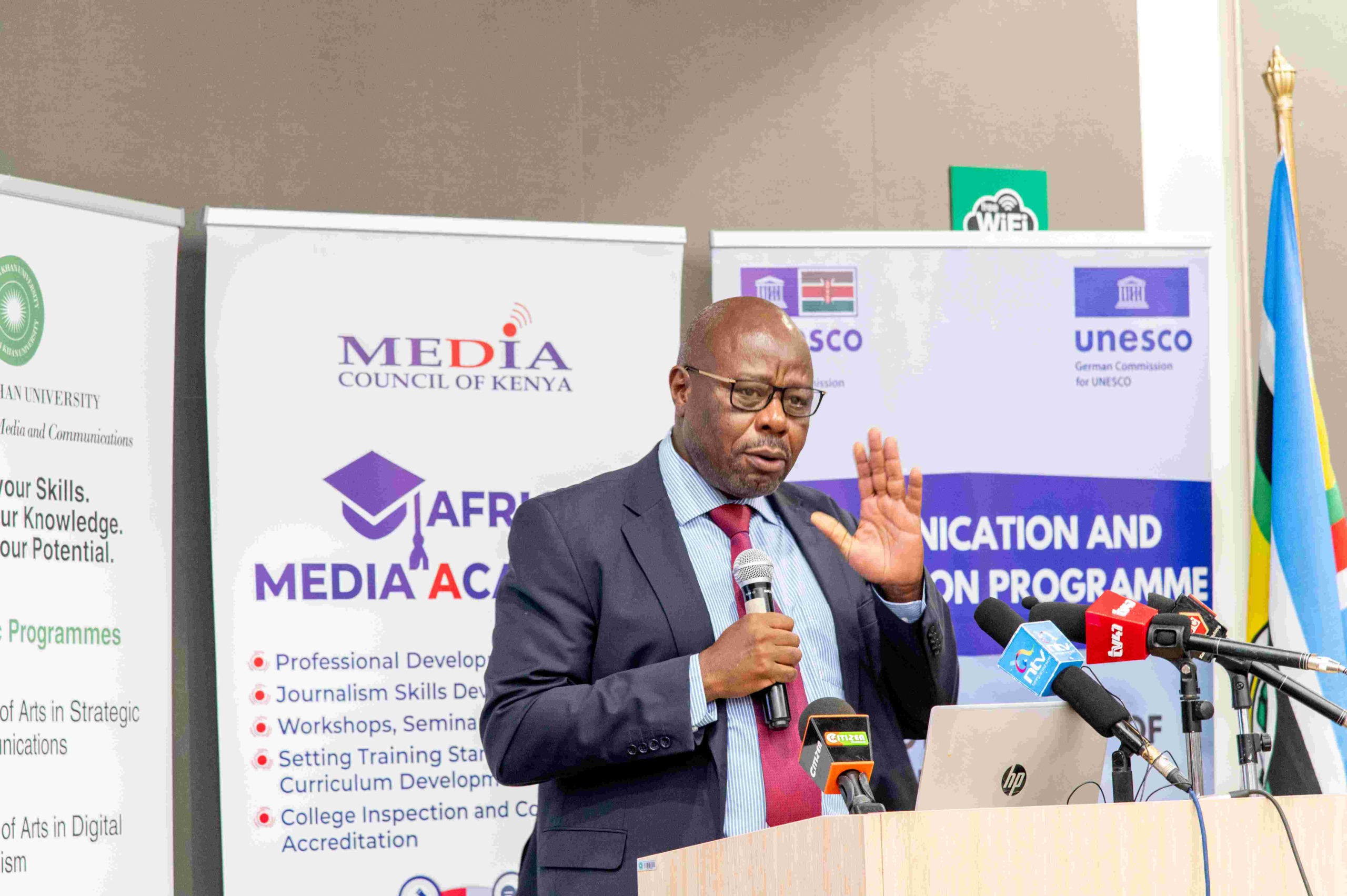
The government is calling on radio industry players to maintain ethical and responsible broadcasting while engaging the massive audience radio commands.
Principal Secretary for the State Department of Broadcasting and Telecommunications at the Ministry of Information, Communications and the Digital Economy Prof Edward Kisiang’ani emphasised radio’s power to connect with audiences and influence societal change.
He cautioned against cutting corners in content creation, which he said, could undermine quality and accuracy.
“Radio, in and of itself, is nothing—it’s the human connection that matters. We must celebrate the profession by producing high-quality, informative and inspiring content”, said Prof Kisiang’ani during this year’s World Radio Day celebrations at the Aga Khan University Graduate School of Media and Communications in Nairobi. The event was organised by the Media Council of Kenya (MCK), Aga Khan University and the Kenya National Commission for UNESCO.
Prof Kisiang’ani also highlighted the critical role radio plays in addressing climate change by educating the public on sustainable practices and environmental conservation.
“We must use radio as a platform to educate people about the dangers of deforestation, pollution and poor waste disposal. Journalists should go beyond reporting disasters and focus on advocating for long-term solutions”, he said.
Acknowledging the evolution of radio in Kenya, the PS commended the rise of vernacular stations as essential in ensuring that information reaches communities in languages they understand. He praised broadcasters for their ongoing efforts to promote national unity, civic education and public discourse on vital issues.
MCK CEO David Omwoyo urged journalists to prioritise research and accuracy in climate change reporting, cautioning against sensationalism and misinformation.
He called on radio stations to invest in training and mentorship programmes to enhance journalists’ capacity for climate reporting.
“As the media landscape undergoes a digital revolution, research must remain at the core of journalistic work. Climate change reporting should not merely highlight disasters but should also provide actionable solutions for communities”, Mr Omwoyo stated.
He also noted that this year’s celebrations reflected the evolution of radio in Kenya, from a single broadcaster to over 300 stations that serve diverse audiences.
He emphasised the need for increased professionalism within the industry and urged journalists to uphold ethical standards in their work.
“We have a duty to ensure that the information transmitted across the airwaves is accurate and informative. It is an ethical challenge to retain the sanctity of radio as a space for true and verified information”, he said.
The MCK CEO further advocated for strengthened mentorship programmes where experienced broadcasters could guide young journalists, ensuring the industry’s sustainability.
He commended the radio fraternity for its role in shaping public discourse and educating audiences on critical national issues.
Prof Nancy Booker, Dean of the Aga Khan Graduate School of Media and Communication, urged radio stations to take a more proactive role in advocating for climate action and educating communities on sustainable solutions.
“Every drop counts in the fight against climate change. Journalists must go beyond reporting problems and actively engage experts and communities in finding viable solutions”, she said.
Prof. Booker also lauded veteran journalists for their pivotal role in mentoring young media professionals and shaping Kenya’s broadcasting industry.
The event included two panel discussions: one on “Environmental Journalism: Fighting Threats of Violence and Promoting Diversity,” and another on “Disinformation and Misinformation on the Climate Crisis.” These discussions provided a platform for experts, media practitioners, and policymakers to delve into the challenges and opportunities in climate change reporting.
The gathering also honoured the late veteran broadcaster Leonard Mambo Mbotela, celebrating his enduring contribution to Kenya’s radio industry and his role in shaping the media landscape.
This year’s event, themed Radio and Climate Change, highlighted radio’s vital role in raising awareness about environmental issues, advocating for sustainable solutions and holding policymakers accountable.
Media stakeholders at the meeting included representatives from the Communications Authority of Kenya, Kenya Union of Journalists, the Kenya Editors’ Guild and journalists from various media houses among others.